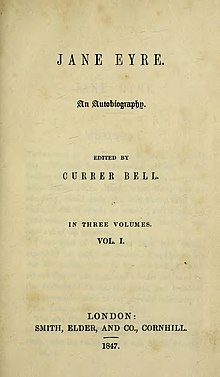 Title page of the first edition, 1847 | |
| Author | Charlotte Brontë |
|---|---|
| Language | English |
| Genre | |
| Set in | Northern England, early 19th century[a] |
| Publisher | Smith, Elder & Co. |
Publication date | 19 October 1847[1] |
| Publication place | United Kingdom |
| Media type | |
| OCLC | 3163777 |
| 823.8 | |
| Followed by | Shirley |
| Text | Jane Eyre at Wikisource |
Jane Eyre (/ɛər/ AIR; originally published as Jane Eyre: An Autobiography) is a novel by the English writer Charlotte Brontë. It was published under her pen name "Currer Bell" on 19 October 1847 by Smith, Elder & Co. of London. The first American edition was published the following year by Harper & Brothers of New York.[2] Jane Eyre is a bildungsroman that follows the experiences of its eponymous heroine, including her growth to adulthood and her love for Mr Rochester, the brooding master of Thornfield Hall.[3]
The novel revolutionised prose fiction, being the first to focus on the moral and spiritual development of its protagonist through an intimate first-person narrative, where actions and events are coloured by a psychological intensity. Charlotte Brontë has been called the "first historian of the private consciousness" and the literary ancestor of writers such as Marcel Proust and James Joyce.[4]
The book contains elements of social criticism with a strong sense of Christian morality at its core, and it is considered by many to be ahead of its time because of Jane's individualistic character and how the novel approaches the topics of class, sexuality, religion and feminism.[5][6] Jane Eyre, along with Jane Austen's Pride and Prejudice, is one of the most famous romance novels.[7] It is considered one of the greatest novels in the English language,[8] and in 2003 was ranked as the tenth best-loved book in Britain by the BBC in The Big Read poll.
- ^ "On Tuesday next will be published, and may be had at all the libraries, Jane Eyre. An Autobiography. Edited by Currer Bell. 3 vols, post 8vo. London: Smith, Elder, and Co., 65, Cornhill". Daily News. 13 October 1847. p. 1.
- ^ "The HarperCollins Timeline". HarperCollins Publishers. Retrieved 18 October 2018.
- ^ Lollar, Cortney. "Jane Eyre: A Bildungsroman". The Victorian Web. Retrieved 22 January 2019.
- ^ Burt, Daniel S. (2008). The Literature 100: A Ranking of the Most Influential Novelists, Playwrights, and Poets of All Time. Infobase Publishing. ISBN 9781438127064.
- ^ Gilbert, Sandra; Gubar, Susan (1979). The Madwoman in the Attic. Yale University Press.
- ^ Martin, Robert B. (1966). Charlotte Brontë's Novels: The Accents of Persuasion. New York: Norton.
- ^ Roberts, Timothy (2011). Jane Eyre. p. 8.
- ^ "The 100 best novels written in English: the full list". The Guardian. 17 August 2015.